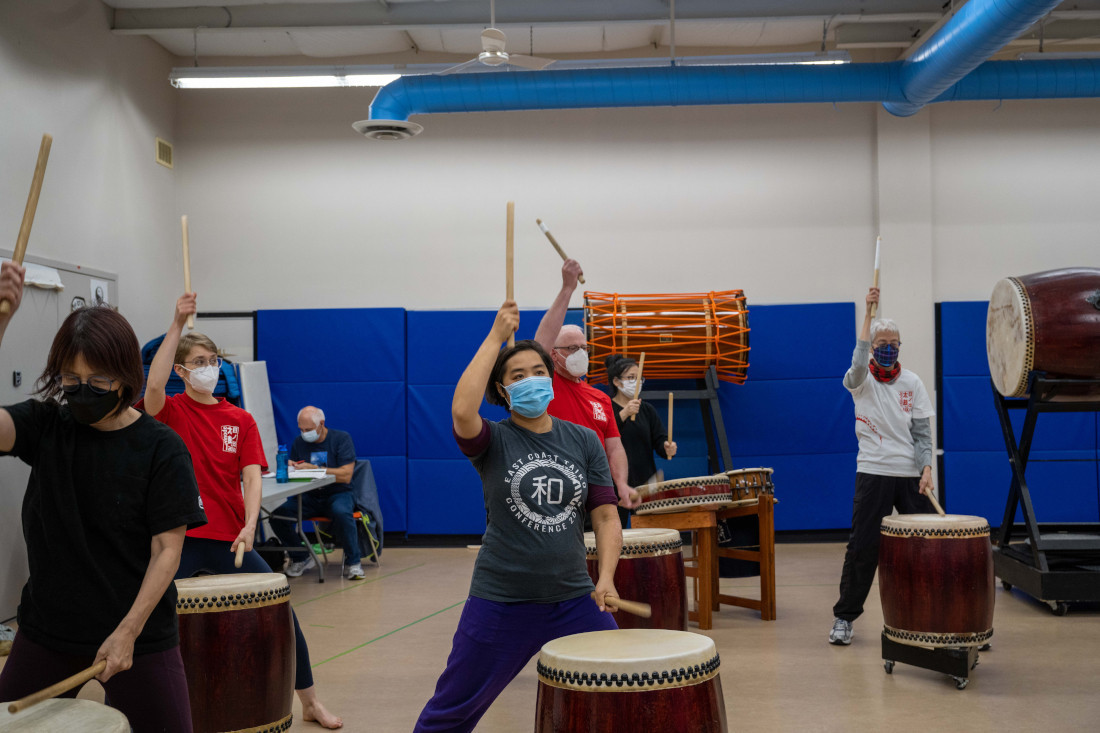The Northern sun also rises
Hinode Taiko on four decades in the ‘Peg and honouring the city itself
Forty years ago, Hinode Taiko planted roots in Winnipeg following an inspiring Folklorama performance. On Nov. 26 and 27, the Japanese drumming group will celebrate a pivotal anniversary.
“I’ve been calling it the hobbit birthday,” Yuko Nozoe, artistic director of Hinode Taiko, says. “I want to give back to the community.”
The Japanese word taiko means “drum” and also denotes the particular blend of song and dance performed by groups like Hinode Taiko (hinode means “rising sun”). The tradition of Japanese drumming for religious and entertainment purposes dates back centuries, although contemporary group taiko developed in the mid 1950s amid a post-war reexamination of patriotism and tradition.
“Taiko you see today in the group style is a mix of physicality, musicality, rhythm, with both traditional and modern takes. Sometimes it’s more traditional Japanese music, but a lot of groups now will do fusion types of music,” Kelly Duke, who has been with the group since 1998, says. “It’s a very versatile kind of drumming.”
Taiko combines music, motion and lively vocalizations in a kinetic, involved art form. For Duke, it’s the verve inherent to the medium that makes it so compelling.
“You get a great workout. If you’re feeling frustrated or emotional about anything, you can really channel that into the drums. You’re not just playing music. You’re using your whole body to convey a message,” Duke says.
Nozoe has been fascinated with the form for as long as she can remember. She mentions being exposed to this style of drumming while visiting Japan for the first time at three years old.
“I can still remember the sound of the drum then, and that was decades ago,” she says. “I just feel like it’s an expression of my culture that is really hard to ignore ... it’s unapologetically Japanese and in your face.”
Along with the double-header performances later in the month, Hinode Taiko will present a matsuri, a piece that traditionally represents a community or geographic region.
“In Japan, each region has its own very distinct matsuri piece that everybody in the village or the community knows,” Nozoe says.
Originally a native of Toronto, Nozoe hopes to distill Winnipeg’s essence on stage and for the performance to endure.
“I wrote it based on my impressions of what Manitoba is about,” she says. “I want members of the community to feel free to express this dance the way they want to. I just hope it turns into a very warm and organic mess of a piece that kind of holds together.”
Despite the devout focus on celebrating a Japanese tradition, the ensemble hosts members of different races, creeds and abilities. Duke mentions the group’s Deaf members and says it’s an “interesting challenge” to “make sure that they’re able to also play and express themselves and be inclusive.”
After all the years spent with the band, what Duke treasures most aren’t memorable performances or moments, but the pure spontaneity of it all.
“At Folklorama, we call the first couple rows the splash zone, because you don’t know what’s going to happen, and we’ve definitely had moments where we dropped a stick, or a stick has gone flying. Luckily, no one’s ever gotten hit in the head, members or audience. For the ones I’ve been at, anyway.”
Hikari, Hinode Taiko's 40th anniversary performance, takes place Nov. 26 and 27 at Centre Culturel Franco-Manitobain (340 Provenche Blvd.). For info and tickets, visit hinodetaiko.ca.
Published in Volume 77, Number 10 of The Uniter (November 17, 2022)








